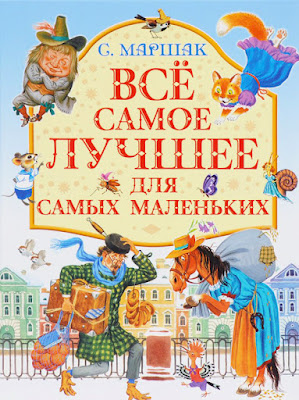Samuil Yakovlevich Marshak was a Russian Soviet poet, playwright, screenwriter , translator and literary critic. His childhood was in the town of Ostrogozhsk near Voronezh.
He studied in the gymnasium there and was lucky to get a motivational teacher who inspired his writing. The teacher of literature instilled in him a love for classical poetry and encouraged the first literary experiments of the future poet.
Marshak’s first collection of poems was the Zionides, dedicated to Jewish topics. One of the poems Over the Open Grave was written on the death of the father of Zionism , Theodor Herzl. At the same time, he translated several poems by Chaim Nachman Bialik from Yiddish and Hebrew.
In 1918 he lived in Petrozavodsk and worked in the local education department.Later on, he worked in the newspaper Morning of the South under the pseudonym Doctor Friken. He published poems and anti-Bolshevik fiction pieces.
In 1919 he published under the name of Doctor Friken, the first collection of Satires and Epigrams. In 1920, while living in Yekaterinodar, Marshak organized a complex of cultural institutions for children there, in particular, he created one of the first children's theaters in Russia and wrote plays for it.
In 1923, he published his first poetic children's books The House That Jack Built, The Caged Kids, The Tale of the Stupid Mouse. Marshak is the founder and first head of the English language department of the Kuban Polytechnic Institute.
In 1960, Marshak published the autobiographical story At the Beginning of Life, in 1961 - Education with a Word (a collection of articles and notes on poetic skill). In 1962, he published the collection Selected Lyrics.
Yesterday and Today by Samuil Marshak
In his poem Yesterday and Today, the children’s author Samuil Marshak describes the situation when modernity is a point of annoyance for old habits.
In the poem a gas lamp, a candle, a milkmaid’s carrying pole and an inkpot with a feather quill are shocked when they see modern tools coming to replace them. They feel abandoned by their masters and the ones who use them. They are apprehensive of these inventions and discuss the betrayal they feel at the hands of the owners.
The poem was written in Russian in 1925. The background of the poem is that in 1917 – the year of the Russian Revolution, when the Tsarist government and old order were overthrown by the Bolsheviks (a radical socialist party). Though the revolution was led by the people, many were not happy with the changes and were insecure about the future. They were used to the old ways, even though it might have hurt them - financially or mentally - being under a torturous and corrupt monarchy.
The poem was written in Russian in 1925. The background of the poem is that in 1917 – the year of the Russian Revolution, when the Tsarist government and old order were overthrown by the Bolsheviks (a radical socialist party). Though the revolution was led by the people, many were not happy with the changes and were insecure about the future. They were used to the old ways, even though it might have hurt them - financially or mentally - being under a torturous and corrupt monarchy.

Image cover translated as Poems and Stories for Children. Samuil Marshak.




No comments:
Post a Comment